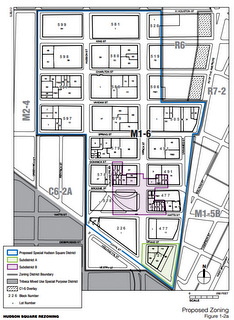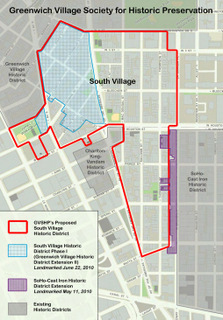
Map of proposed Special Hudson Square district. Subdistrict B was eliminated from the proposal. Image Courtesy: DCP.
Community Board urges Trinity to build a new recreation center to accommodate projected population increase. On February 12, 2013, the City Council’s Zoning & Franchises Subcommittee held a hearing for Trinity Church’s application to rezone 18 blocks generally bounded by West Houston and Canal Streets, Avenue of the Americas, and Greenwich Street. The Special Hudson Square District will facilitate residential development, maintain commercial office space, and encourage ground-floor retail. Trinity Church owns approximately 39 percent of the lots within the proposed Special District.
The proposal would retain the area’s M1-6 zoning, but would add provisions to allow residential and increased community facility uses. The Special District would establish height limits of 185 feet on narrow streets and 320 feet on wide streets as well as setback regulations. The proposal also includes Subdistrict A (see inset map), which would set a height limit of 430 feet. Subdistrict A would accommodate Trinity Church’s plans to develop a mixed-use development with a 75,000-square-foot, 444-seat public school across from Juan Pablo Duarte Square Park. The maximum floor area ratio would be 10.0 for non-residential uses and 9.0 for residential uses, with a possibility of 12.0 for participation in the City’s Inclusionary Housing Program. The proposal would also establish protective provisions to prevent the permanent conversion of existing commercial space and control hotel development. (See CityLand’s past coverage here).
The City Planning Commission held a hearing on the proposal on November 28, 2012 and approved the proposal with modifications on January 23, 2013. Manhattan Community Board 2 testified against the Special District citing Trinity’s inadequate proposals to provide the area with open space. Manhattan Borough President Scott M. Stringer recommended conditional approval of the application asking for height reduction on wide streets and open space options. Property owners in the area testified requesting increased heights for midblock sites on narrow streets in order to achieve the maximum floor area ratio available under the City’s Inclusionary Housing Program. The Borough President, Community Board, local elected officials, community groups, and local residents testified to request that City Planning urge the Landmarks Preservation Commission to landmark nearby South Village. City Planning credited Trinity’s $5.6 million contribution commitment for nearby Tony Dapolito Recreation Center renovations as an adequate mitigation of the rezoning’s adverse open space impact. In response to the affordable housing issue, City Planning added a special permit provision to allow midblock sites on narrow streets to modify height (up to 210 feet) and setback requirements. City Planning declined to comment on the South Village landmarking, stating that the issue was out of the Commission’s scope of review. (See CityLand’s past coverage here).
On February 12, 2013, the City Council’s Zoning & Franchises Subcommittee held a hearing on the proposal. Representatives from the Community Board were present at the hearing to reiterate their opposition to the proposal unless Trinity adequately resolves the open space issue. Representatives testified that the rezoning would bring 7,000 to 8,000 new people to an area that is already lacking in open space. The Community Board was not satisfied with Trinity’s $5.6 million contribution commitment to Dapolito Recreation Center because the Center is Parks-controlled and ought to be improved with public funds. The Community Board demanded that Trinity build a new recreation facility in exchange for the benefits rezoning would bestow on them. Eileen McColgan, a parent of a student at NYC iSchool located at 131 Avenue of the Americas, testified that the NYC iSchool and the Chelsea Career and Technical High School share a building without a gymnasium. Students must use an auditorium, some small weight rooms, or make private arrangements after school in order to fulfill their New York State physical education requirements. She requested that Trinity address the community’s existing needs by constructing a new recreational facility.
Jesse Masyr, of Wachtel, Masyr & Missry, testified on behalf of Edison Properties, the owners of 274 Spring Street. He testified that City Planning’s special permit provision for midblock sites to request a height maximum of 210 feet would only apply to the Spring Street site. He stated that the proposed height would prohibit the owner from achieving the full 12 FAR allowed under the City’s Inclusionary Housing Program. He testified that the particular site, currently a storage building and parking lot, is on a unique shallow block that is 175 feet deep compared with an average block depth of 200 feet. He asked the Council to raise the maximum height to 230 feet, which would ensure the owner’s use of the Inclusionary Housing Program and result in approximately 50 units of permanent affordable housing. He also testified that a special permit requirement to get an additional 25 feet is “too much process for too little result.” Representatives of other property owners in the area who would not be subjected to the special permit provision, including Extell Development Company at 68-70 Charlton Street and Toll Brothers at 78-86 King Street, testified in support of a height increase to 210 feet on midblock, narrow street sites in order for their developments to utilize the Inclusionary Housing Program.

Map of proposed and existing South Village Historic District. Image Courtesy: Greenwich Village Society for Historic Preservation.
Landmarking of an area known as the South Village was also heavily discussed at the hearing. The South Village Historic District was designated in 2010 as the Greenwich Village Historic District Extension II. However, local elected officials, the Community Board, residents, and the Greenwich Village Society for Historic Preservation all contended that a second, larger swath of the community directly adjacent to Hudson Square should be designated as well. Advocates suggested that the Hudson Square rezoning will negatively impact the undesignated parts of South Village by catalyzing development pressure in the area. Advocates suggested that any rezoning be simultaneous with the South Village’s designation by the Landmarks Preservation Commission. According to Greenwich Village Society for Historic Preservation, the South Village is not currently calendared for designation but is “landmark eligible.”
The Subcommittee closed the hearing without a vote. The City Council has until March 18, 2013 to vote on the proposal.
Council: Special Hudson Square Rezoning and Text Amendment (C 120380 ZMM – rezoning); (N 120381(A) ZRM – text amendment) (January 23, 2013).

